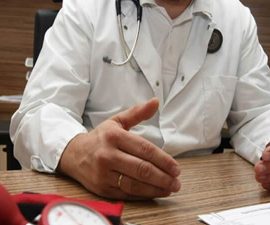… Continued …
Muscle spasms
In severe cases, meningitis may cause the back to become painfully rigid and arched (opisthotonos). Young children and infants are more likely to have opisthotonos. But in a few cases, it also can affect older people.
Opisthotonos, a kind of abnormal posturing, is caused by strong muscle spasms. And meningitis is one of common reasons for these spasms. Actually, these spasms are the body’s mechanism of trying to help relieve irritation of the meninges. But since the nervous systems in infants and young children have not fully developed, they can experience backward arching of the spine, neck, and head.
Kidney failure
Some patients with meningitis (especially bacterial meningitis) may develop complications of the disease. The longer they have the disease without appropriate treatment, the higher the risk of developing permanent neurological damage and other serious complications.
The disease may lead to long-term consequences such as kidney disease. As mentioned before, it can affect the circulatory system. This can make your kidneys work harder than usual. As a result, you may have serious kidney damage. And back pain (especially in the flank area) is common symptom of kidney disease.
Meningococcal disease
It is a serious, acute bacterial infection caused by meningococcus. The infection can cause a number of infectious diseases. The main ones are meningitis and septicaemia (affecting the blood, also called blood poisoning).
Meningococcal meningitis can occur with septicaemia, making the disease more difficult to treat. Meningococcal infection that has entered the circulation can cause muscle ache or joint pain which may also affect the back.
Again, back pain can be attributed by many factors and causes. Even in people with meningitis, it may be triggered by something else. If you do believe that your pain may signal abnormal health condition, see a doctor without delay – this is particularly true if it comes with common symptoms of meningitis!
The disease is dangerous if left untreated, especially for bacterial meningitis. Early diagnosis and treatment is important to prevent the disease from getting worse and reduce the risk of potential long-term side effects.
- https://medlineplus.gov/ency/article/003195.htm
- https://www.cdc.gov/meningococcal/





Hi, my wife had the virus, an she still has pain in her neck an her back. It comes out of no where, what can I do or get her for the pain
Viral meningitis will usually relieve on its own within several weeks. A few lifestyle measures are often helpful enough to cope with (e.g. keeping hydrated, enough bed rest, or (if necessary) over-the-counter pain relievers). However, it’s also important to diagnose the exact kind of virus that causes the inflammation. For instance, it has to do with a herves virus, anti-viral medications are required. See a doctor if the problem lasts longer than expected!